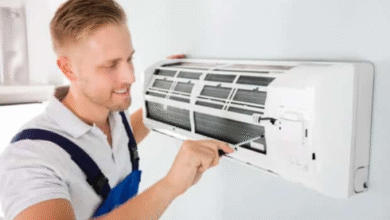Rethinking the Water We Rely On: From Homes to Heavy Industry

Water runs quietly in the background of daily life, so much so that we rarely stop to consider it. A morning shower, the kettle for coffee, laundry spinning in the machine, the sprinkler ticking across the lawn—each moment depends on something we barely notice. But when water doesn’t behave—when it stains sinks, leaves spots on dishes, or tastes just slightly “off”—suddenly it becomes impossible to ignore. That’s when people start digging deeper into treatment, testing, and purification, realizing water isn’t as simple as turning on the tap.
The Role of Industry
It’s easy to think of water treatment as a household issue, but industries rely on it even more. Manufacturing plants, food processors, breweries, and hospitals all depend on water purity not just for safety but for efficiency. The wrong mineral balance can corrode equipment or ruin a product line. That’s why working with an industrial water purification company matters. These providers understand scale and complexity—systems designed not for a single kitchen sink but for thousands of gallons flowing every day. For businesses, clean water isn’t just a matter of taste. It’s about protecting investments and ensuring products meet strict standards.
The Everyday Battle with Hard Water
On the home front, one of the most common frustrations is hardness. Hard water sneaks into daily routines in subtle ways: soap that refuses to lather, towels that feel scratchy, white streaks on glasses, and showers that leave skin uncomfortably dry. Over time, it wears down appliances and even pipes. That’s why so many families go looking for hard water treatment solutions, whether through softeners, conditioners, or filtration setups tailored to their specific supply. It’s less about luxury and more about making sure daily life runs without a constant battle against mineral buildup.
Testing Before Treating
The smartest step before diving into treatment is always testing. You can guess what’s in your water, but until you measure, you’ll never really know. That’s where residential water testing services come into play. A simple test can reveal whether the problem is iron, chlorine, bacteria, nitrates, or hardness—and in what concentration. Armed with that knowledge, homeowners can avoid wasting money on systems that don’t actually solve their issues. It’s like seeing the blueprint before fixing the house. Without it, you’re just guessing.
The Cost of Doing Nothing
The hesitation is understandable. New systems cost money, and nobody wants another expense. But untreated water costs too, in ways that creep up slowly. Appliances break down sooner. Energy bills climb as water heaters work harder through mineral buildup. Cleaning supplies multiply as you battle stains that keep returning. Even health can take a hit if bacteria or contaminants slip through unchecked. Seen through that lens, treatment often pays for itself—by saving money, saving time, and cutting down on low-level stress you may not even realize you’re carrying.
Small Shifts You’ll Notice
When treatment is in place, changes arrive in quiet ways. Coffee tastes sharper. White laundry stays white instead of fading into a grayish tint. Showers feel smoother, with skin and hair less dry. Even pets seem to drink more, sensing the freshness in their bowls. These aren’t dramatic, overnight transformations, but subtle shifts that stack up until one day you realize just how much better everything feels. Water might not be glamorous, but when it’s right, it improves every corner of the household.
Why Businesses Should Care Too
It’s not just families who benefit from clean water. Restaurants need it for both taste and hygiene. Gyms depend on it for showers and hydration stations. Hotels quietly rely on it to keep linens soft and plumbing systems running smoothly. For businesses, water quality can influence customer experience in ways that never make the brochure but always affect reviews and reputation. Customers may not say “the water was great,” but they will notice when it isn’t.
Environmental Wins Along the Way
Another overlooked piece is sustainability. Every household or company that treats its water properly reduces waste in indirect ways. Fewer plastic bottles get purchased. Appliances last longer, cutting down on landfill contributions. Heating systems run more efficiently, trimming energy use. Even reducing cleaning chemicals has an environmental payoff. Clean water isn’t just good for your home or your bottom line—it’s good for the planet.
Maintenance Isn’t a Nightmare
One concern people often raise is upkeep. Won’t these systems just create more work? In truth, most modern setups are designed with ease in mind. Filters need replacement only once or twice a year. Softeners require simple salt refills. Some systems even include smart reminders to alert you when it’s time for attention. And for those who’d rather not think about it at all, service providers offer maintenance plans that handle everything in the background. Compared to the constant annoyances of untreated water, upkeep is refreshingly minimal.
Stories That Stick
The strongest arguments for better water don’t come from brochures—they come from real people. A neighbor relieved their dishwasher finally lasted longer than two years. A friend who noticed their skin cleared up after fixing their water. A business owner grateful that customers stopped complaining about the taste of drinks. These small, human stories make the benefits tangible. They turn treatment from an abstract technical fix into something that changes daily life in noticeable ways.
Wrapping It Up
At the end of the day, water treatment isn’t about shiny equipment or fancy jargon. It’s about making life simpler, healthier, and more comfortable. For industries, it’s about protecting equipment and keeping standards high. For households, it’s about showers that feel fresh, coffee that tastes right, and appliances that last. Whether it’s testing, softening, or full-scale purification, the goal is the same: water you can trust. And once you’ve experienced that, you’ll wonder how you ever managed with less.




